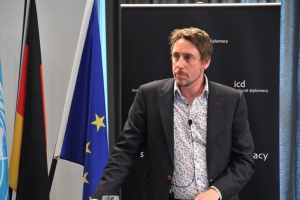Difference between revisions of "Prof. Gavin Phillipson"
Przyvylska (talk | contribs) (Created page with "Cultural Diplomacy & Freedom of Expression By Prof. Gavin Phillipson (Professor, Durham Law School; UK) 400x200px|thumbnail|left There are people in Brit...") |
Przyvylska (talk | contribs) |
||
| Line 2: | Line 2: | ||
By Prof. Gavin Phillipson (Professor, Durham Law School; UK) | By Prof. Gavin Phillipson (Professor, Durham Law School; UK) | ||
| − | [[File:Phillipson|400x200px|thumbnail|left]] | + | [[File:Phillipson.jpg|400x200px|thumbnail|left]] |
There are people in Britain and other European countries that favor a much freer regime for the press, and there are scholars in America who are very critical of First Amendment jurisprudence. People are talking through international conferences that allow greater insights, which allow people to begin to use ideas from other cultures to oppose developments they don’t like within their own. So yes, it’s something that’s beginning to become more multi-faceted and break down some of the starker contrasts.” | There are people in Britain and other European countries that favor a much freer regime for the press, and there are scholars in America who are very critical of First Amendment jurisprudence. People are talking through international conferences that allow greater insights, which allow people to begin to use ideas from other cultures to oppose developments they don’t like within their own. So yes, it’s something that’s beginning to become more multi-faceted and break down some of the starker contrasts.” | ||
Revision as of 13:31, 25 March 2014
Cultural Diplomacy & Freedom of Expression By Prof. Gavin Phillipson (Professor, Durham Law School; UK)
There are people in Britain and other European countries that favor a much freer regime for the press, and there are scholars in America who are very critical of First Amendment jurisprudence. People are talking through international conferences that allow greater insights, which allow people to begin to use ideas from other cultures to oppose developments they don’t like within their own. So yes, it’s something that’s beginning to become more multi-faceted and break down some of the starker contrasts.”
…
Laws can always be an expression of national identity, and then simultaneously reinforce them. So there’s always a kind of complex interplay between law and culture. Essentially, laws can generally only undermine the legal systems of others if one state has a stronger bargaining power, and the other state has signed up to a treaty in which they’ve agreed to compromise their own legal traditions. There should be some form of negotiation.
- The Berlin Freedom of Expression Forum; Berlin, Germany, February 28th- March 2nd, 2012
